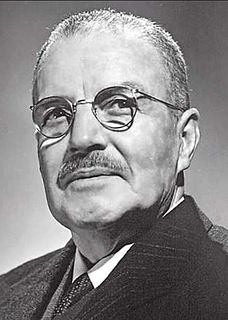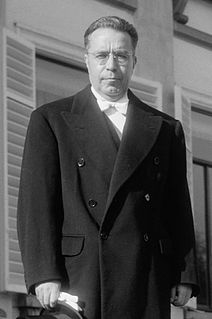After the Communist leader Nicolae Ceaușescu was executed in the Romanian Revolution of December 1989, the National Salvation Front (FSN) took power, led by Ion Iliescu. The FSN transformed itself into a political party and overwhelmingly won the general election of May 1990, with Iliescu as president. These first months were marked by violent protests and counter-protests, involving among others the coal miners of the Jiu Valley.

The Social Democratic Party of Albania is a social-democratic minor political party in Albania. The party held seats in Parliament between 1992 and 1996, and again from 1997 until 2009. It is currently led by Skënder Gjinushi, a former Minister of Education (1987–1991) and Speaker of Parliament.

The Social Democratic Party, founded as the Democratic Peoples' Party, is a liberal-conservative and liberal political party in Portugal. Commonly known by its colloquial initials PSD, on ballot papers its initials appear as its official form PPD/PSD, with the first three letters coming from the party's original name. Alongside the Socialist Party (PS), the PSD is one of the two major parties in Portuguese politics. Although branded as a social democratic party, the party is in practice a centre-right conservative party.

The Social Democratic Party is the major social-democratic political party in Romania, founded by Ion Iliescu, Romania's first democratically-elected president. The largest party in Parliament with initially 63 seats in the Senate and 158 seats in the Chamber of Deputies, it also has the largest number of mayors, local and county councilors and county presidents thus being the biggest and most influential political force in the country.

The Movement for the Liberation of São Tomé and Príncipe/Social Democratic Party is one of the main political parties in São Tomé and Príncipe. Jorge Bom Jesus is the current president of the party.

The CDS – People's Party is a conservative, Christian democratic, and national-conservative political party in Portugal. In voting ballots the party's name appears only as People's Party, with the acronym CDS-PP unchanged.

General election were held in Romania on 28 November 2004, with a second round of the presidential election on 12 December between Prime Minister Adrian Năstase of the ruling Social Democratic Party of Romania (PSD) and Bucharest Mayor Traian Băsescu of the opposition Justice and Truth Alliance. Băsescu was elected President by a narrow majority of just 51.2%.
The Justice and Truth Alliance was a political alliance comprising two political parties in Romania: the centre-right liberal National Liberal Party (PNL) and the initially social-democrat Democratic Party (PD), which later switched to center-right ideology.

The Conservative Party was a conservative political party in Romania. Founded in 1991, after the fall of Communism in Romania, originally under the name Romanian Humanist Party. From 2005 until 3 December 2006, the party was a junior member of the Government of Romania. The party adopted the name Conservative Party on 7 May 2005. In June 2015 it merged with the Liberal Reformist Party to form the Alliance of Liberals and Democrats.

Presidential elections were held in Chile on 4 September 1952. The result was a victory for Carlos Ibáñez del Campo, who ran as an independent.
The Social Democratic Party is a political party in Benin.

Legislative elections were held in Romania on 30 November 2008. The Democratic Liberal Party (PDL) won most seats in both the Chamber of Deputies and the Senate, although the alliance headed by the Social Democratic Party (PSD) won a fractionally higher vote share. The two parties subsequently formed a governing coalition with Emil Boc of the PDL as Prime Minister.

The Democratic Liberal Party was a liberal-conservative political party in Romania. The party was formed on 15 December 2007, when the Democratic Party (PD) merged with the Liberal Democratic Party (PLD). On 17 November 2014 the PDL officially merged into the National Liberal Party (PNL), ceasing to exist. The PDL was associated with Traian Băsescu, who was previously leader of the PD and President of Romania from 2004 to 2014.
The Social Democratic Party was created following a split in the Social democratic union party on April 9, 2007 in Spain, in the Valencian Community, its ideology is social democratic.
The National Union PSD+PUR was an electoral alliance in Romania in 2004.

Presidential elections were held in Brazil on 3 October 1955. The result was a victory for Juscelino Kubitschek, who received 35.7% of the vote. Voter turnout was 59.7%.
Bolivia held a general election on 5 January 1947, electing both a new President of the Republic and a new National Congress.
The Antifascist Democratic Front was a political alliance of the traditionalist and left-wing parties in Bolivia.














